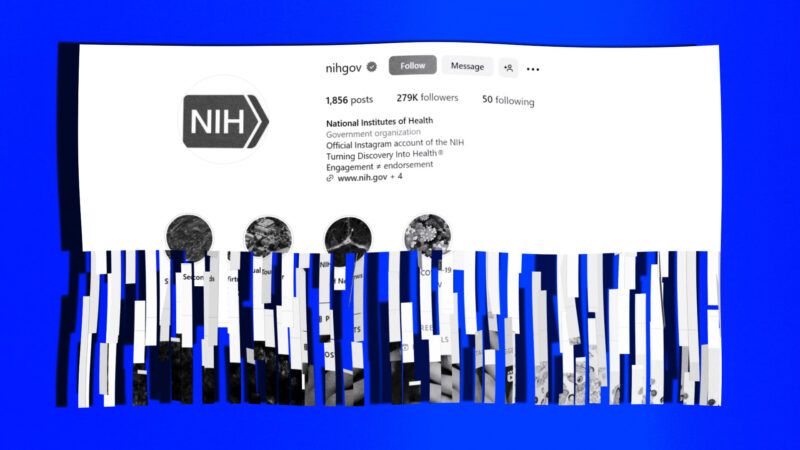The NIH Deleted Comments Criticizing Animal Testing. A Federal Court Says That Violates the First Amendment.
The NIH had been deleting all social media comments containing words like animal, testing, and cruel.

The National Institutes of Health (NIH) violated the First Amendment rights of animal rights activists whose social media comments were deleted by the agency, a federal appeals court ruled last week.
The agency had been deleting all comments on its Facebook and Instagram pages that contained certain keywords related to criticism of the agency's use of animal testing. Comments containing words like animal, testing, and cruel were singled out for deletion as part of a broader policy of deleting "off-topic" comments.
Activists from People for the Ethical Treatment of Animals (PETA) sued in 2021, arguing that this practice was a clear violation of commenters' First Amendment rights and claiming that NIH social media pages were "traditional public forums," meaning that the NIH could not enforce any content-based restrictions on speech.
After first facing defeat at a lower court, the U.S. Court of Appeals for the District of Columbia Circuit ruled last Tuesday that the NIH had violated the activists' First Amendment rights. However, the court disagreed that the NIH social media account comment sections were traditional public forums. Instead, the court agreed with NIH lawyers that the comment sections were "limited" public forums "because the government has signaled its intent to limit the discussion on those threads to specific subjects."
But even if the NIH can constitutionally moderate comments based on content, the court found that the agency's restrictions on commenters' speech were unreasonably restrictive. "In the context of NIH's posts—which often feature research conducted using animal experiments or researchers who have conducted such experiments—to consider words related to animal testing categorically 'off-topic' does not" abide by common sense, wrote Judge Bradley N. Garcia for the court.
To illustrate this point, Garcia brought up the example of an Instagram post featuring a photo of the eye of a zebrafish killed in NIH research. "It is unreasonable to think that comments related to animal testing are off-topic for such a post," Garcia wrote. "Yet a comment like 'animal testing on zebrafish is cruel' would have been filtered out because 'animal,' 'testing,' and 'cruel' are all blocked by NIH's keyword filters."
Additionally, Garcia argued that the NIH's "off-topic" policy is also unreasonable because it is "inflexible and unresponsive to context," and commenters have no opportunity to challenge the removal of their comment.
"The permanent and context-insensitive nature of NIH's speech restriction reinforces its unreasonableness, especially absent record evidence that comments about animal testing materially disrupt NIH's ability to meet its objective of communicating with citizens about NIH's work," Garcia wrote. "The government should tread carefully when enforcing any speech restriction to ensure it is not viewpoint discriminatory and does not inappropriately censor criticism or exposure of governmental actions."


Show Comments (18)